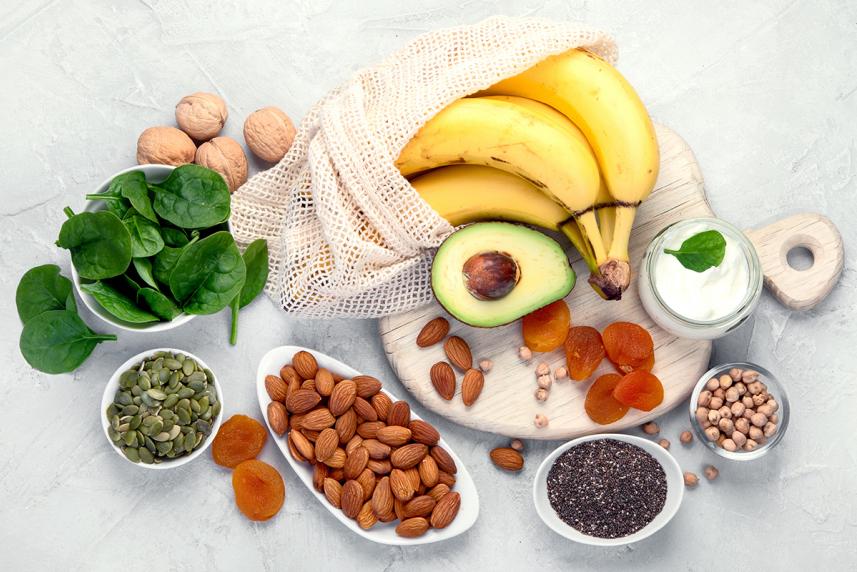
We have more than 60,000 doctors at over 2,000 locations. Our team will help you get the care you need, when and where you need it.

You’re probably not getting enough of these vitamins and minerals. Here’s how to fill your plate with power foods for your body and mind.
You try your hardest to eat a healthy diet (you really do!). That’s a smart habit, since food is the best source of most of the key nutrients your body needs. But you’re likely still missing out on some important vitamins and minerals.
“Americans don’t always eat the right foods,” says registered dietitian Bonnie Taub-Dix. She’s the author of Read It Before You Eat It: Taking You from Label to Table. “We aren’t getting enough fruits and vegetables, which are a great source of many nutrients.”
The good news: It’s not hard to make every meal a nutritional powerhouse. And it takes only a few small tweaks to your meal plan. Read on for a top-5 list of essential nutrients your body needs and the foods that will deliver them.
Your body needs potassium for almost everything it does. Potassium supports normal blood pressure and helps your kidneys function smoothly. It also supports nerve function, helps your muscles contract and more.
But many American adults don’t get the recommended daily amount of potassium, according to the American Heart Association. Most women need 2,600 milligrams (mg) of potassium a day and most men need 3,400 mg per day.
It’s not hard to find foods that have a lot of potassium, says registered dietitian Stephanie D. Giraulo. She’s director of food and nutritional services for St. Charles Hospital in Port Jefferson, New York, and St. Catherine of Siena Hospital in Smithtown, New York. Vegetables and fruits are great sources. Fill your grocery cart with:
Try this delicious power dish: Serve baked potato wedges with cooked, chopped broccoli and a little grated cheddar. Have a sliced banana for dessert.

We have more than 60,000 doctors at over 2,000 locations. Our team will help you get the care you need, when and where you need it.
This mineral is crucial for bone health, but there’s a good chance you aren’t getting enough of it, says Taub-Dix. Men need around 1,000 mg of calcium per day, and women need 1,000 to 1,200 mg. Calcium is found in dairy products such as:
If you have a lactose intolerance, it can be a bit more challenging to meet your daily calcium goals. Get in the habit of reading the labels on nondairy milks and cheeses to see how much calcium they contain. “Some provide even more calcium than dairy milk,” says Taub-Dix.
It’s best to get your calcium from foods. But calcium supplements are another option (just be sure to talk to your doctor first). If you take a supplement, keep in mind that calcium is best absorbed when you take 500 mg or less at a time. So if you’re taking 1,000 mg per day, divide the dose in half and take it twice a day.
You can find a range of supplements to support your mind and body at the Optum Store. Shop now.
Try this delicious power dish: Pull out your blender and make a “creamsicle” smoothie. Mix low-fat milk, calcium-fortified orange juice, tangerine slices and unsalted almonds.
Vitamin D helps your body absorb calcium, so it plays a crucial role in boosting bone health. You need 15 micrograms of vitamin D per day. If you’re a milk drinker, you don’t have to think too hard about it: Cow’s milk is fortified with vitamin D. Many plant-based milk alternatives, such as almond milk and oat milk, are also fortified with D. Other good sources include:
Your body also makes vitamin D from sunlight. A few times a week, head outside and get between 5 and 30 minutes of sun on exposed skin, as recommended by Harvard Health Publishing. That should help you make enough vitamin D on your own. (Just be sure to wear sunscreen the rest of time to protect yourself against skin cancer.)
Try this delicious power dish: Fill an omelet with broiled salmon chunks and fresh asparagus. Serve with a glass of milk.
“There are a lot of important reasons to get enough magnesium in your diet,” says Taub-Dix. Magnesium helps your muscles and nerves function properly, regulates blood sugar levels and blood pressure, and builds bone health.
If you don’t get enough of this vital nutrient, you could develop a deficiency. You have a higher risk if you have Type 2 diabetes, a gastrointestinal disorder or an alcohol use disorder.
Women need 310 to 320 mg of magnesium daily and men need 400 to 420 mg. It’s not quite as easy to find magnesium in foods, but there are some tasty options. Some of the best are:
“Pumpkin seeds are a great source of magnesium,” Taub-Dix says. “And almonds have more magnesium than any other nut.”
Try this delicious power dish: For a hearty afternoon snack, try a bowl of oatmeal sprinkled with pumpkin seeds and almonds. Stir in some apple chunks and sweeten it with a drizzle of maple syrup.
This mineral helps support muscle metabolism and healthy connective tissue. Your body also uses iron to produce hemoglobin. That’s a vital protein in red blood cells that carries oxygen from your lungs to the rest of your body.
Women need 18 mg of iron per day, and men need 8 mg. If you’re a vegetarian, you need twice that much. And pregnant women should get around 27 mg per day.
Red meat is an excellent source of iron. Your body absorbs 2 to 3 times more iron from animal sources than it does from plant sources, according to the Academy of Nutrition and Dietetics. But don’t stress if you’re not a meat eater: You can also get this nutrient from a variety of legumes, vegetables and fortified foods.
Good animal sources of iron are:
Some top nonanimal sources of iron include:
Your body will absorb more iron from a nonanimal source if you eat something that is rich in vitamin C at the same time, says Giraulo. Good C-rich foods include citrus fruits, sweet peppers and tomatoes.
Try this delicious power dish: Make a stir-fry with thin strips of lean beef and broccoli, and serve it with orange wedges or sliced fresh strawberries.
Additional sources
Potassium levels: American Heart Association (2018). “A Primer on Potassium”
Vitamin D and sun: Harvard Health Publishing (2017). “Two Keys to Strong Bones: Calcium and Vitamin D”
Iron absorption: Academy of Nutrition and Dietetics (2020). “Foods to Fight Iron Deficiency